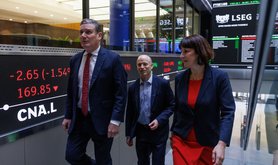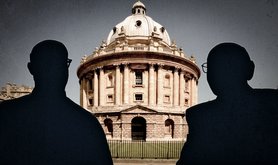
Revealed: 'Sloppy' Whitehall departments spent £56m on COVID-19 consultants
British government departments have spent over £56m on consultancy firms during the pandemic, with most contracts awarded without any competition.

Whitehall departments have spent over £56m on consultancy firms to help deal with the coronavirus pandemic, mostly without giving other companies the chance to compete for the work, openDemocracy and the Guardian can reveal.
Sixteen private consultancy firms, including major companies like Deloitte, PWC, Boston Consulting Group and McKinsey have been working at the heart of the government’s response to the virus.
They have been rapidly hired to work on the track and trace system, the purchase of personal protective equipment (PPE) and the search to produce working ventilators.
Among the contracts given to McKinsey, whose consultants were paid £563,000 for six weeks’ work – £14,000 a day - to create a permanent replacement for Public Health England, helping define its “vision, purpose and narrative”.
Get dark money out of UK politics!
Sign our petition to put pressure on the government to tighten electoral laws and shine more light on political donations. We need to know who is giving what to our political parties.
Whitehall departments have not published a full inventory of contracts that have been awarded to firms during the pandemic, despite official guidelines that they should be made public within 30 days.
However, dozens of unpublished contracts have been leaked to the Guardian, which analysed them in partnership with openDemocracy.
The leaked information, alongside that contained in public registers of contracts, reveals the scale of public money being spent by the civil service on consultants, who can charge hundreds of pounds an hour in fees for their services.
Meg Hillier MP, the chair of the public accounts committee which scrutinises Whitehall spending, said she would write and ask the government for more details of the contracts, as she believed that the lack of transparency was “sloppy”.
She questioned why Whitehall was outsourcing to consultancy firms “bread and butter work that the government should be doing”.
Tom Sasse, a researcher at the Institute for Government, a think-tank which has examined the use of consultants by the government, said: “As numbers in the civil service have been significantly cut back in recent years, we have seen government departments rely more and more on consultants. But it is not always clear that these consultants are being used well or where they can add value.”
During the pandemic, ministers have used special powers to bypass normal tendering rules, allowing public bodies ranging from Whitehall departments to local councils to give contracts quickly to commercial companies such as consultancy firms without requiring them to organise an open competition.
The usual rules were suspended in March at the start of the outbreak under an obscure piece of legislation which public bodies have used to avoid lengthy tendering processes in many cases.
A confidential Whitehall document shows that government departments are continuing to give contracts to consultancy firms and other commercial companies without competition. The Cabinet Office said the government is shifting away from awarding contracts to private companies without a tender.
The big consultancy firms have been awarded a series of multi-million pound contracts.
Deloitte has been given contracts worth at least £8m from four Whitehall departments. It was hired to help set up a network of drive-through rapid testing centres which were designed to be the backbone of the government’s plan to control the spread of coronavirus.
However there was criticism that failings led to the test results of NHS staff being lost or sent to the wrong person, leading to some hospitals discussing whether to take over one of the testing centres from Deloitte.
The firm says it does not run or manage the testing centres, but supported the Department of Health to accelerate testing capacity.
Deloitte was also hired by the Cabinet Office to advise on the procurement of personal protective equipment from the UK and abroad. Some figures in the UK manufacturing industry accused Deloitte of pursuing factories in China, where prices have leapt and supply is tight, rather than on focussing on improving production from UK factories.
PWC, another big consultancy firm, is being paid up to £3m by the Cabinet Office to provide financial advice until the end of the year. The Treasury has also given the firm a contract, worth up to £2.5m, for advice over six months.
PWC has a £1.4m, six-month contract from the culture department to help run a £200m emergency coronavirus fund for small charities struggling to survive the impact of the crisis on their regular fundraising. Some charity leaders have questioned the need for PWC to be involved in the fund.
Another consultancy firm, Ernst & Young, was awarded two £400,000 contracts to manage publicity around the programme to track and trace people who are potentially infected with the virus, and to improve the purchase of PPE.
Consultants from KPMG were hired by the NHS to help build the temporary Nightingale hospitals so that they could treat coronavirus patients instead of overwhelming other NHS hospitals.
The Department for International Development gave Boston Consulting Group a £4.5m contract to help support poor countries in the fight against the virus.
Consultancy firms, including Cambridge Consultants, were also given millions to take part in Boris Johnson’s wartime-style appeal to British companies to produce large numbers of ventilators.
A Cabinet Office spokesperson said: “As part of an unprecedented response to this global pandemic we have drawn on the expertise of a number of private sector partners.
“This is completely in line with procurement regulations for exceptional circumstances, where being able to procure at speed has been critical in the national response to COVID19."
Tamzen Isacsson, chief executive of the industry’s lobbying body, the Management Consultancies Association, said: “Since the outbreak of COVID-19, government departments have faced an unprecedented volume of workload and using external resources has enabled the government to work quickly and with intensity on major initiatives across the UK.
“At short notice we’ve been able to bring world class technical expertise and multi-disciplinary capabilities and it has been our priority to strengthen the UK government’s response, processes, and provide value for money to government departments.”
Read more
Get our weekly email




Comments
We encourage anyone to comment, please consult the oD commenting guidelines if you have any questions.